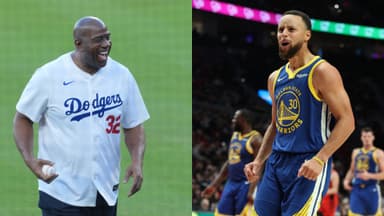Charles Barkley and Michael Jordan once used to be very close friends. In addition to their shared interests, like golf, gambling and dominating on the basketball court, they also had the common trait of taking things personally. While Jordan revealed everything that irked him in the Netflix documentary “The Last Dance,” Barkley did it in his self-titled biography by Timothy Bella. Losing the 1990 MVP was one of them.
In the 1990 NBA MVP voting, Barkley finished second behind Los Angeles Lakers icon Magic Johnson despite receiving the most first-place votes with 38. Johnson, who had 27 first-place votes, edged the then-Philadelphia 76ers star on second-place votes. The Lakers star earned 38 second-place votes, while Barkley could muster only 15. After the final count, Johnson has 634 points, while the 76ers superstar finished 614. The Lakers star won his second straight NBA MVP award and third in four years. Barkley is still miffed about losing that race. In his biography, he is quoted as saying:
“I haven’t let it go. I’m never letting it go.”
The 1989-90 MVP race is one of the tightest in NBA history. Johnson and Barkley weren’t the only two in contention for the award. Michael Jordan also had a strong claim to win the MVP award. Here are the averages of all three players that season:
- Magic Johnson: 22.3 points, 6.6 rebounds, 11.5 assists
- Charles Barkley: 25.2 points, 11.5 rebounds, 3.9 assists
- Michael Jordan: 33.6 points, 6.9 rebounds, 6.3 assists
The retirement of Kareem Abdul-Jabbar, arguably one of the three greatest players in NBA history, swayed the votes in Johnson’s favour. The superstar guard led the Lakers to a 63-19 record. They had six more wins than in the previous season when Kareem was on the team. In the East, Barkley’s 76ers finished with a 53-29 record, while Jordan led the Bulls to a 55-27 record.
The three-horse race was so tight that voters weren’t sure who they would pick as the MVP until they put the names on the ballot. New York Daily News writer Fred Kerber revealed after Johnson was handed the award:
“Right up until the day I put in the ballot, I was voting for Jordan. Then the last day I switched [to Johnson]. If I had to vote for it right now, I might vote for Jordan. It was that close.”
Unfortunately for Barkley, Kareem’s retirement and the Lakers’ league-best record did just enough for Johnson to take home the award. But if it’s any consolation, he did win the MVP award in 1993 with the Phoenix Suns after leading them to a 62-20 record.
NBA is no stranger to controversial MVP voting
The NBA MVP voting process is pretty straightforward but subjective. The league selects a panel of 100 voters, who rank their top five MVP candidates in descending order. The first-place rank is worth 10 points. Second, third, fourth, and fifth hold 7,5,3 and one point, respectively. The player with the most points after compiling the votes from the 100 panellists is named the NBA MVP.
The subjectivity of the voting process can sometimes yield unpopular results. Perhaps the most glaring instance of an unpopular MVP voting result is the 2005-06 season. Kobe Bryant played his heart out on a poor Los Angeles Lakers team, leading them to a seventh-placed finish in the Western Conference. He averaged 35.4 points, 5.3 rebounds and 4.5 assists. He became only the fourth player in NBA history to average over 35 points per game in an NBA season and the first since Michael Jordan in 1986-87.
Despite Bryant’s heroics, Phoenix Suns star Steve Nash won his second-straight NBA MVP award, and the Lakers icon finished fourth in MVP voting. Shockingly, the guard won the award despite his team having the third-best record in the NBA, behind the San Antonio Spurs and the Detroit Pistons.
The result irked fans and analysts alike. The argument about the Lakers’ seventh-placed finish did not hold weight as the Suns were only the third-best regular season in the league. Nash’s averages of 18.8 points, 10.5 assists, and 4.2 rebounds also didn’t impress many. It took two years for the voters to rectify their error. In the 2007-08 season, Bryant won his first and only MVP award after averaging 28.3 points, 6.3 rebounds and 5.4 assists.
In 2005-06, Nash’s Suns and Bryant’s Lakers met in the first round of the Western Conference playoffs. Bryant dragged Nash and the Suns to seven games despite having an inferior supporting cast. Phoenix took home the win, but Bryant proved he was the more valuable player to his team.








